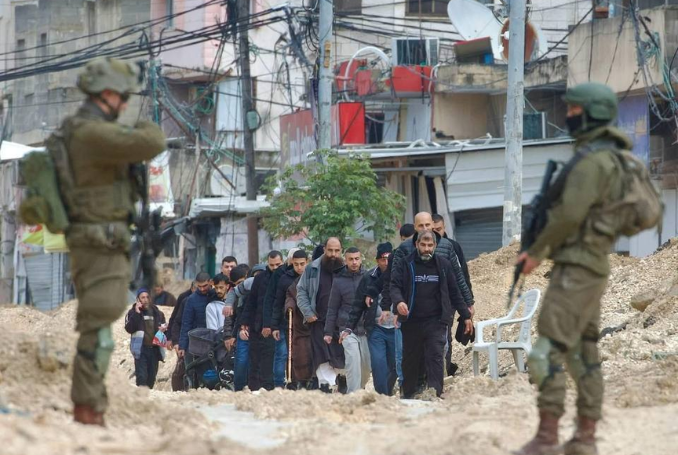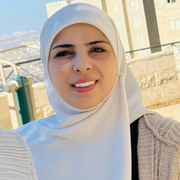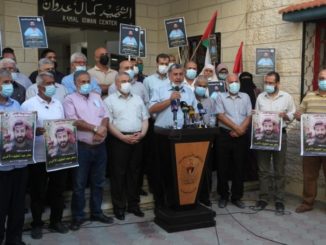
Tens of thousands of Palestinians continue to endure displacement and loss in Tulkarm and other northern West Bank refugee camps under ongoing Israeli military aggression.
Tasneem Sleit continues to endure the suffering of displacement after being expelled with her family from their home in Tulkarm camp, like tens of thousands of other Palestinians.
The Israeli military aggression against the refugee camps in the northern West Bank has been ongoing for three months, with no end in sight.
All residents of the Jenin, Tulkarm, and Nur Shams camps have been forcibly evicted from their homes, and hundreds of these homes have been demolished as part of a broader plan to erase the refugee camps and completely alter their landscape under the pretext of eliminating armed resistance cells.
More than 40,000 displaced persons from these camps are living in difficult conditions without official Palestinian support. More than half of them have taken up residence in centers, halls, and clubs in the cities of Jenin and Tulkarm, suffering from a lack of aid and an uncertain future.
No Greater Feeling of Despair
On January 27, Israeli aircraft bombed a target in Tulkarm camp, killing two Palestinians. At the time, Tasneem was outside her home in the al-Madaris neighborhood of the camp and was unable to reach it due to a large-scale Israeli army raid.
Since then, Tasneem has not seen her home. She and her husband were forced to rent a house on the outskirts of the camp, but the Israeli army stormed it on March 12 and turned it into a military barracks, forcing the family to flee once again.
“A few weeks ago, my parents received an order from the Israeli court to demolish their home inside the camp. Then I learned that my home had been demolished. There is no feeling more difficult than this: to have the memories, belongings, and beautiful years we spent there vanish in such moments. It is an extremely harsh thing,” she told the Palestine Chronicle.
“The displaced are completely exhausted,” Tasneem said, describing their situation, amid Israeli military announcements that they will remain in the camps until next year, with no clear future for them.
“We are waiting for news of withdrawal so we can return to our homes, most of which have been destroyed, and the remaining homes have been severely damaged. Life in the camp is unbearable. There are those who say we will return to the camp even if we stay in a tent, despite knowing that they are forbidden from rebuilding their homes,” she said.
The displaced are not just looking for food; they also need many things that are not available to them, such as clothes they left behind in their homes, now buried under rubble, and general necessities for children.
The majority of volunteers serving the displaced have stopped working, unable to cope with the increasing burdens. This is not to mention the large number of Tulkarm residents whose homes were destroyed by soldiers because they overlooked the camp or were used as military barracks.
The residents have no alternative housing options other than the already overcrowded shelters.
When Will Our Tragedy End?
Ambulance driver Hazem Masarweh is experiencing the most difficult days of his life after being displaced from his home in Jenin camp.
Masarweh told us that he was forced to flee his home inside the camp at the start of the offensive. He was able to rent a house to avoid being confined to shelters, but he doesn’t have any cooking or laundry supplies inside the house.
“All the food aid provided to the displaced contains grains that must be cooked, but we don’t have stoves or ovens, which has worsened our suffering,” he told us.
To distribute the heavy load, Hazem and his two children were forced to move to one location, while his wife and daughter moved to another, and their eldest son moved to a third. They visit each other every 20 days.
Masarweh owns the Ibn Sina Medical Center in the camp, which the Israeli army has raided several times, destroying its contents. He is unaware of the fate of his home inside the camp.
“We are experiencing a complex psychological state. We are trying to survive with only what we have, and we are constantly thinking about our homes and the camp’s alleys that we grew up in. Will we ever return to them? What does it look like now? When will our prolonged tragedy end?”
Perhaps the greatest concern for the displaced is the lack of any prospects or end to this aggression, similar to previous incursions. The continued displacement weighs heavily on the shoulders of the displaced and their hopes for a dignified life, which seems like a mirage under occupation.
(The Palestine Chronicle)

– Fayha’ Shalash is a Ramallah-based Palestinian journalist. She graduated from Birzeit University in 2008 and she has been working as a reporter and broadcaster ever since. Her articles appeared in several online publications. She contributed this article to The Palestine Chronicle.








Be the first to comment